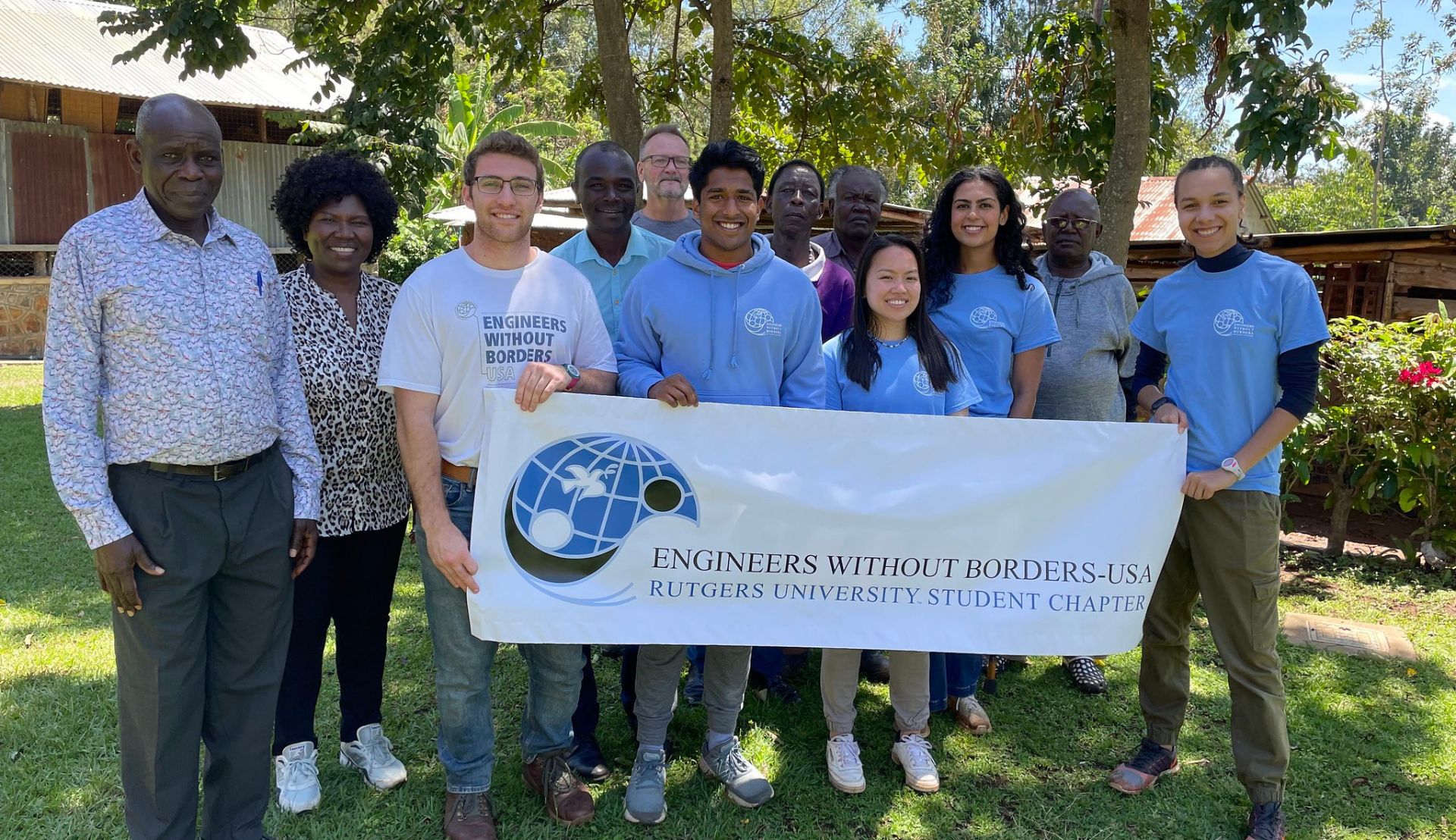Asenath Dande, Executive Director of International Faculty and Scholar Services at Rutgers Global, recently led a cohort of Rutgers School of Engineering students to Kenya to volunteer on behalf of the Rutgers University Chapter of Engineers without Borders (EWB). Check out photos from their visit here. EWB sends highly skilled volunteers around the world to work directly with communities to find the best solutions for their infrastructure needs. The Rutgers chapter of EWB went to the village of Kolunje, with whom they’ve developed a relationship over ten years, to work on connecting the water supply from the well at Magwar Model Secondary School to five additional locations, including schools and a hospital.
The five students who traveled to Kenya in mid-March were David Garner, President of the RU chapter of EWB; Kendra Stephens, Communications Lead; Amanda Rafferty, Kenya Project Lead; Ishani Dave, Finance; and Nikhil Suresh. The students were joined by Randy Krizmanich, a professional engineer, who was an adviser on the engineering projects, and Dande, who is originally from Kenya and has strong ties to the country especially through her NGO, the Hitaji Development Initiative, of which she is the Founder and CEO.
“My background is not in engineering,” laughed Dande, “but the EWB chapter was looking for a mentor and a connection to Kenya and found my information in their database from a few years back, and they reached out to me.” Dande was happy to participate and helped the group with understanding the region and the local landscape, interpreting the language, understanding cultural traditions, and organizing transportation for the group to get around. She was also able to serve as a liaison with county government officials, the local village, and the NGO Watsan--a partner on the project--and helped the group organize a stakeholders meeting. “I learned a lot!” she said. She also organized a meeting with Kara Amoratis, Rutgers Director for Global Travel, Safety & Security, for an Orientation session, which was very helpful.
Dande was impressed with the maturity of the Rutgers engineering students and appreciated their commitment to listening to the community in order to best serve their needs. “The students understood that they were there to help, not ‘cure’,” she noted. Because of Covid, there had been a gap since the Rutgers EWB chapter last visited Kolunje. On this trip, the Rutgers EWB group wanted to collect data on the current water tanks and assess how the water was being used, as well as help form a plan for ongoing maintenance. Their main task was to compile data and assess where to install the additional water kiosks to increase water capacity in the Kolunje village, starting with the institutions. The proposed sites were: the Abiero Girls Secondary School (620 students), the Magwar Primary School (550 students), the Miranga Secondary School (400 students), the Miranga Primary School (400 students), and the Miranga Sub County Hospital (60-100 people per week).
On the site visits, the Rutgers group met with principals and students and checked on the water tanks—there were some surprises. Some of the tanks needed repairs, so the Rutgers team got right to work, not only fixing problems but helping to share information with staff so they could keep the tanks in good working order moving forward. The Rutgers team was also able to assess usage and efficiency, such as whether bigger tanks were needed and how to address the rainy season and droughts. They also focused on enhancing the water system throughout Kolunje.
In their community report, the Rutgers students determined that the well should be capable of meeting the demands of the additional kiosks. They also outlined the future plans for the Rutgers chapter and the village of Kolunje. Their short-term plans are to build a kiosk at the fence of the Model School, install piping from Model School to Abeiro Girls Schools and Magwar Primary School, and add in a pump (hand or electric) at Abiero Girls Schools / Magwar Primary to pump up to the water tower. Long-term plans include building a pipeline distribution network from Magwar Model Secondary School to Miranga Sub-County hospital, and use the geographical survey data to scope out other potential well sites ideally near Abeiro Girls School and Magwar Primary School. They will also build a large tank (50,000 L) at Magwar Model Secondary School to power the entire water supply down to the hospital.
In addition to the volunteer work, Dande organized side trips for the group to enjoy the beauty of Kenya, including a visit to Lake Victoria to watch the sunset, and a safari for the students at the Maasai Mara National Reserve.
Dande said: “Before the trip and based on my experience with my NGO, I had asked the students and Randy Krizmanich to bring along small items with them that would be incredibly helpful to the students and leave a lasting impact on them, such as pens, pencils, and sanitary pads. They blew me away with how much they brought! It was wonderful to share these items with the students.” Dande added that she agreed with EWB students’ plan to offer an engineering lesson and/or activity to the secondary school students during the next visit to introduce them to basic concepts in engineering.
“This trip was really an incredible experience for me,” added Dande. “I was so impressed with our Rutgers Engineering students and the impact they are making on the village of Kolunje through Engineers without Borders. These kinds of long-term and respectful relationships have a huge positive impact and bring our countries closer together.”

